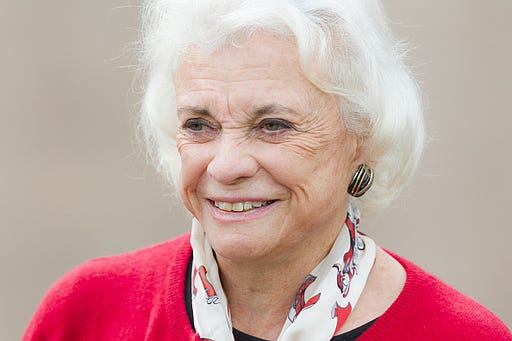|
My life has gotten very small and I’m not happy about that. I used to know some farmers and got to hear them talk about their lives and now I don’t know any. I have very few friends who live in small towns. I know plenty of writers, lawyers, teachers, performers, and nobody who earns a living as a carpenter, plumber, or electrician. And so far as I know, none of my friends are Republicans. I used to have some but they died or became independents. I miss their points of view.
This struck home when I read about Sandra Day O’Connor who died earlier this month. I listened to an interview she gave the Times in 2008 on condition it be released only after her death. It’s a memento of Republicanism as it once was and which the country needs now, a party of civility and pragmatism and patriotism.
She grew up on a primitive Arizona ranch far from town, loved the life, went away to Stanford and found her vocation in the law when the idea of women lawyers was rather novel. She worked on the law review with a classmate, married him, had three children, practiced law on the side, got into Republican politics, became a judge, and in 1981 President Reagan appointed her to the Supreme Court, the first woman justice. He’d promised to appoint a woman during the 1980 campaign, which helped him beat Jimmy Carter.
It’s wonderful hearing her at age 78 talking cheerfully about her life. As a young woman, she was hired by the Arizona attorney general, who assigned her to work at the state mental hospital. “To do what?” she said. “Whatever they need,” he said. So she went about organizing a legal aid clinic for the mentally ill, a simple necessary good. Big law firms weren’t hiring women lawyers for fear of what clients might think, so she started her own. As Chief Justice Roberts said, “She broke down barriers for women in the legal profession to the betterment of that profession and the country as a whole.” She was a mid-level state judge when Reagan appointed her — she thought he liked the fact that she’d grown up on a ranch — and off to Washington she went. She was a conservative but a pragmatist at heart, a problem-solver, and as the Court shifted ideologically, she held her ground and cast deciding votes on some historic cases. As you hear her talk about her life and work, you note that there is no resentment, no anger. Bombasticity, not a trace.
The reporter asks how she felt when decisions were overturned for which she’d written the majority opinion and she says, “Well, how would you feel?” That’s as angry as she gets. I had Republican aunts like her; I miss them.
When her husband was diagnosed with Alzheimer’s, she took care of him. “In the early days of my husband’s illness, I often took him to court with me because he could not be left alone.” She stepped down from the Court to care for him as his condition deteriorated. He wound up in a care center, deep into Alzheimer’s, and there, forgetting he had a wife, he fell in love with another woman, and Justice O’Connor visited the two of them, holding hands, in love, he no longer recognizing her, and she was glad to see him happy. This is pragmatism of a very high order.
I read fundraising mail from progressives about empowering all voices from diverse backgrounds and identities to create spaces of healing and inspire a sense of authentic belonging in our journey toward equity, diversity, and inclusivity, eliminating oppression and developing effective tools for social justice, and O My God do I miss hearing farmers talk about the weather, my aunts talking about my grandfather driving a team of horses pulling a cultivator, holding the reins in one hand and a book in the other.
I’m in love with a pragmatic woman, thank goodness, who snorts aloud at “create spaces of healing” and “effective tools for social justice,” but who feels at home in a hardware store and can deal with bureaucracy on the phone. I attend a church with two women rectors, I go to a woman dentist and a woman neurologist. I have a niece aiming to be an architect, friends’ daughters and granddaughters taking their places in law and medicine and academia, most of them leaning leftward but nonetheless they owe a debt to plainspoken Republicans like Justice O’Connor. We are poorer without her.
If you like these newsletters, you can support this effort by:
Clicking the Subscribe button (though this is free, you can make a paid contribution)
Stopping by our Store and selecting what works for you - CLICK HERE
Sending a check to: Prairie Home Productions, P.O. Box 2090, Minneapolis, MN 55402
You’re on the free list for Garrison Keillor and Friends newsletter and Garrison Keillor’s Podcast. For the full experience, become a paying subscriber and receive The Back Room newsletter, which includes monologues, photos, archived articles, videos, and much more, including a discount at our store on the website.





